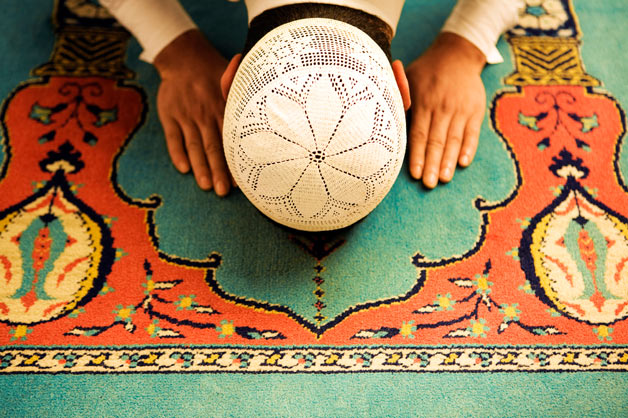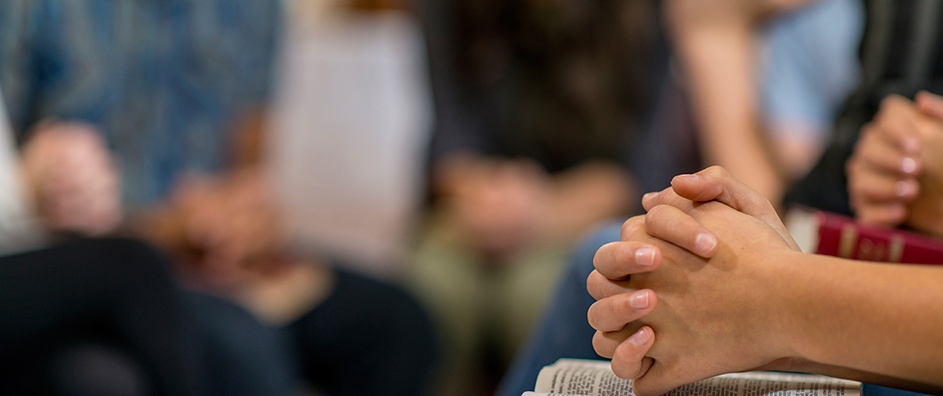The views expressed in our content reflect individual perspectives and do not represent the authoritative views of the Baha'i Faith.
How do you pray?
Every spiritual tradition has its own way of expressing devotion and love. Some bow down in reverence; some recite prayers at set times every day; some say grace before eating a meal; some dance in ecstatic remembrance; some chant a mantra and some stay completely silent, communing with God mentally and spiritually.
Ancient tribal cultures often inscribed or painted their prayers on the rocks around them, and today we can still see that visible evidence of their artistic supplications to the Creator.
 Most of the world’s religions have prescribed rites and rituals for praying. Muslims practice salat, which involves prostrating yourself before God in prayer at regular times each day. Hindus often chant or use various prayer rituals. Congregational prayer among those who practice Orthodox Judaism generally requires bowing and swaying in a group called a minyan; and observant Jews of all types utilize the siddur prayerbook. Some Buddhists use nembutsu, a form of meditative prayer that utilizes a repeated mantra. Many Christians pray using a common liturgy, as in the Catholic mass, while others use the Book of Psalms or create their own prayers. Some Sufi sects known as whirling dervishes spin themselves into an altered state of prayerful transcendence.
Most of the world’s religions have prescribed rites and rituals for praying. Muslims practice salat, which involves prostrating yourself before God in prayer at regular times each day. Hindus often chant or use various prayer rituals. Congregational prayer among those who practice Orthodox Judaism generally requires bowing and swaying in a group called a minyan; and observant Jews of all types utilize the siddur prayerbook. Some Buddhists use nembutsu, a form of meditative prayer that utilizes a repeated mantra. Many Christians pray using a common liturgy, as in the Catholic mass, while others use the Book of Psalms or create their own prayers. Some Sufi sects known as whirling dervishes spin themselves into an altered state of prayerful transcendence.
People who think of themselves as spiritual but not religious often pray privately, and many incorporate their prayers into their daily lives and spiritual practice, seeking communion with a higher power. Some use incense or light a candle. Some read prayers from a holy book, some sing their prayers, some chant rhythmically.
No matter how you choose to pray, Baha’is believe, we all address the same God. Rather than a host of competing deities or a separate one for each Faith, the Baha’i teachings say that we have one Creator, an unknowable essence who hears our prayers:
I pray that your inner sight may become clear, that you may be able to perceive things the heedless do not see, that you may understand the infinite worlds of God. A man who has no knowledge of the heavenly universe has missed a portion of his heritage and is like unto a stone which knows nothing of humanity. May God open your inner sight, so that you may know his secrets, attain to the highest degree of existence, become manifestors of a spiritual humanity and have your share of the heavenly wisdom… – Abdu’l-Baha, Divine Philosophy, pp. 118-119.
Rather than rites, rituals or dogmatic practices, the Baha’i teachings emphasize the essential unity of all Faiths:
God has created us, one and all — why do we act in opposition to His wishes, when we are all His children, and love the same Father? All these divisions we see on all sides, all these disputes and opposition, are caused because men cling to ritual and outward observances, and forget the simple, underlying truth. It is the outward practices of religion that are so different, and it is they that cause disputes and enmity — while the reality is always the same, and one. The Reality is the Truth, and truth has no division. Truth is God’s guidance, it is the light of the world, it is love, it is mercy. These attributes of truth are also human virtues inspired by the Holy Spirit. So let us one and all hold fast to truth, and we shall be free indeed! – Abdu’l-Baha, Paris Talks, pp. 120-121.
This all-encompassing viewpoint means that Baha’is see all Faiths as one. Because of that essential harmony and unity, Baha’is pray in many different ways, minimizing ritual and emphasizing openness, spiritual connection and the unifying ideal of people of all Faiths praying together.
In the Baha’i teachings, the idea of worship centers around that paramount goal of unity:
In the Baha’i Cause arts, sciences and all crafts are (counted as) worship. Briefly, all effort and exertion put forth by man from the fullness of his heart is worship, if it is prompted by the highest motives and the will to do service to humanity. This is worship: to serve mankind and to minister to the needs of the people. – Abdu’l-Baha, Paris Talks pp. 176-177.
Do harm to nobody; pray for all; try to make your light shine in the world and let your banner fly high in the Heavens. – Abdu’l-Baha, Paris Talks, p. 118.
We work and pray for the unity of mankind, that all the races of the earth may become one race, all the countries one country, and that all hearts may beat as one heart, working together for perfect unity and brotherhood. – Abdu’l-Baha, Paris Talks, p. 99.
















Comments
Sign in or create an account
Continue with Googleor